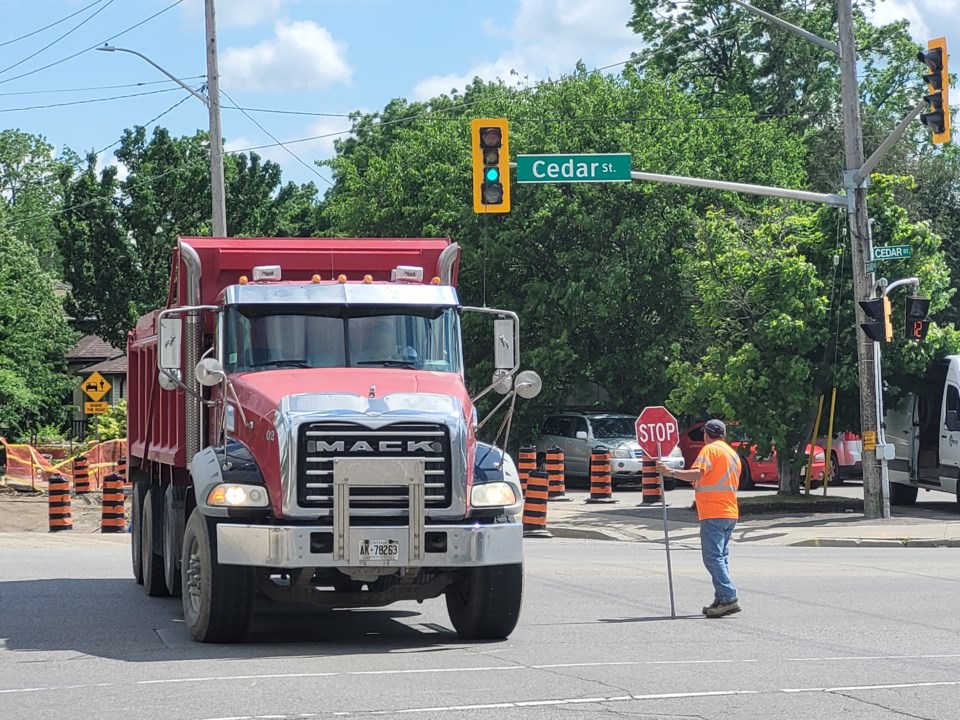The City of Cambridge will need to take on close to $70 million in tax-funded debt to see several already-approved major capital projects through to completion over the next few years.
It's a figure that doesn't come close to funding the total cost of those projects through 2026.
At $207.3 million, that total includes an $85.5 million debenture funded through development charges and $52.4 million from other city reserves and development charges.
Among the projects the city will fund through taxes, development charges and reserves are the Fountain Street Soccer Complex at $13.4 millon, the Preston Auditorium expansion at $29.2 million, the recreation complex at $112.7 million, the Blackbridge Road bridge and road project at $20.6 million, the Riverside dam rebuild at $19.8 million and Townline Road, $11.6 million.
It's part of $730 million in capital investments the city plans to make over the next 10 years. Some of those projects could be delayed.
Council learned about the planned debentures along with a breakdown of the state of the city's assets during a workshop last Thursday that acted as a preview of upcoming budget discussions.
Unfunded projects over the next decade include $25 million needed for fire services, $13 million for parks, $4.7 million for rec facilities and $12.4 million for streetscape projects on Milling and Dickson streets, none of which have been approved but are in various master plans and forecasts.
Deputy city manager for infrastructure services Yogesh Shah walked council through the asset management plan which monitors the city's $3.8 billion in assets to determine where investment is needed based on life span and condition.
Those assets include everything from roads, parks and rec centres to bridges, sewers and water lines.
About 71 per cent of city assets are in "very good or good condition" while 12 per cent of assets are classified as "poor or very poor," an increase of about three per cent from the last assessment done in 2020.
Those deteriorating assets have added to a $137-million funding gap as the city works to replace or repair $21 million in stormwater infrastructure, $49 million in roads and bridges, $52 million in recreation and culture, and about $15 million in corporate and other needs.
Roads account for some of the city's largest annual costs but with current funding levels set at around $9 million a year for not only roads, but stormwater, water and wastewater repairs, it's not enough.
Because of the shortfall, the city has only reconstructed or resurfaced an average of 3.2 kilometres of road over the last five years when the target should be 13 kilometres based on the age of those roads, Shah said.
Bumping that funding to around $15 million annually would allow the city the keep up with repairs based on condition needs, Shah said.
"Maintaining current capital investment towards existing assets may result in faster degradation of assets, increased rates of premature failures of assets, more potholes, lower quality roads, increased flooding, and increased staffing an resources to react to repairs and maintenance," he said.
Mayor Jan Liggett wanted to know the cause of the funding gap and asked if it was created from a combination of a previous administration's effort to hold the line on tax increases or the fact that "every year we try to keep the taxes down for the public so we don't raise it to what it should be to keep up."
Shah said multiple factors impact the gap, including limits to taxation, smaller than anticipated assessment growth, not enough investment from provincial or federal governments, and the fact the city still doesn't charge stormwater management fees when other municipalities do.
He said the solution is to keep championing the need for more funding to address those needs, especially for the in-ground infrastructure residents don't see.
"Ignoring, or not paying attention to that may result in future problems," he said.
The city's chief financial officer Sheryl Ayres said a recent public engagement survey on the 2024 budget showed 94.3 per cent of respondents support additional funding for the replacement of aging infrastructure.
"I feel there is support from the community in order to be making sure that we're investing in replacement of our aging infrastructure through taxes," she said.




